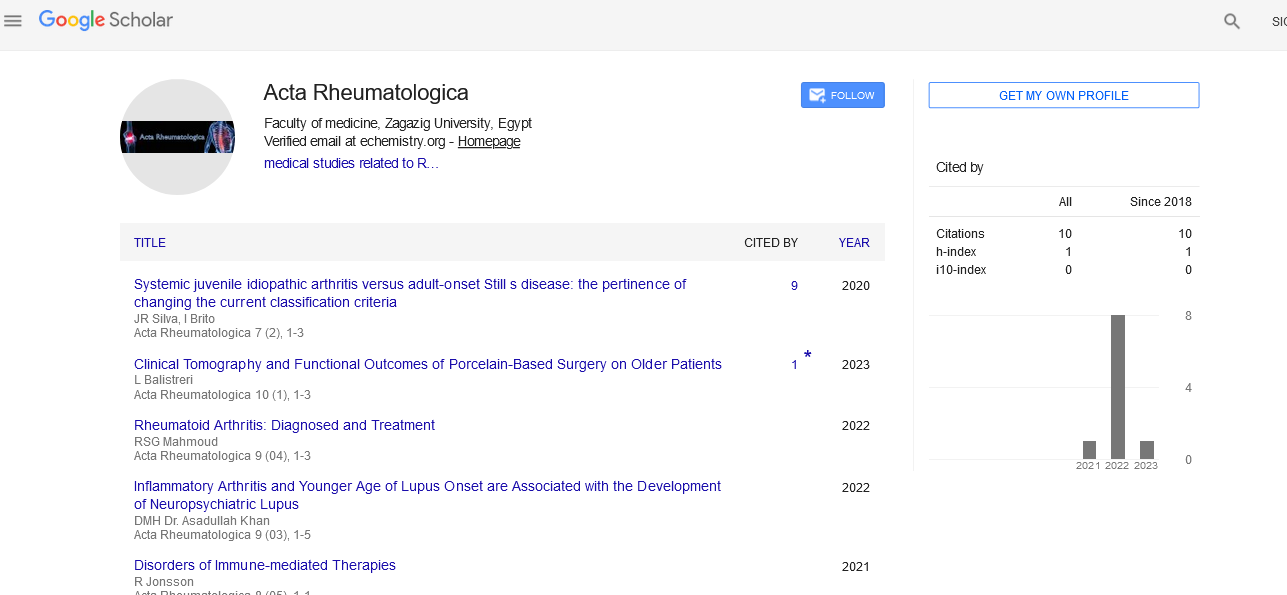Everitt Reynolds*
Department of Health Sciences, Dundalk Institute of Technology, Dundalk, Ireland
- *Corresponding Author:
- Everitt Reynolds
Department of Health Sciences, Dundalk Institute of Technology,
Dundalk, Ireland.
E-mail: reynolds.ev45@yahoomail.com
Received Date: October 09, 2021; Accepted Date: October 23, 2021; Published Date: October 30, 2021
Citation: Reynolds E (2021) Cardiovascular Risk in Rheumatoid Arthritis. Acta Rheuma. Vol.8 No.5:2
Commentary
Cardiovascular disease is the leading cause of death globally. According to the 2017 Global Burden of Disease Study, 17.8 million people died from cardiovascular disease worldwide, accounting for 21% of all fatalities. Traditional risk factors for cardiovascular disease include age, gender, race, hypertension, diabetes, smoking, and hyperlipidaemia, which are all included in various prediction models. However, some non-traditional risk factors, such as chronic inflammation, have emerged as risk factors for cardiovascular disease over the last 20 years.
Rheumatoid arthritis is the most prevalent autoimmune arthritis, with a prevalence of up to 1%, and is distinguished by symmetrical polyarthritis with potential systemic symptoms. Rheumatoid arthritis is recognised as an independent risk factor for cardiovascular disease, owing to the underlying chronic inflammatory process. Traditional cardiovascular risk factors, on the other hand, continue to be significant.
Rheumatoid Arthritis (RA) is a disease that causes widespread impairment due to systemic immune-inflammatory reactions. Aside from joint degeneration, bone erosion, and severe pain, which have a substantial influence on patients' physical function, emotional state, and quality of life, RA also increases the risk of cardiovascular disease and reduces life expectancy. Traditional synthetic disease-modifying antirheumatic medicines (DMARDs), as well as biological DMARDs and other recently found therapies, such as targeted synthetic DMARDs, are used to treat RA. Steroids are used to control active disease during the acute stages. Including an ever-expanding therapeutic arsenal, remission in RA is now a viable goal, with pain, joint discomfort, and functional improvements. Nonetheless, severe health impairment is nonetheless frequently encountered by a significant proportion of patients, who frequently discover that their "own and their physicians' treatment goals, expectations, and aspirations are rarely satisfied." Furthermore, drugs can cause severe adverse effects such as weight gain and insulin resistance, raising the risk of cardiovascular disease and general morbidity.
As a result, it is probably unsurprising that patients frequently seek nutritional therapy with varying outcomes and placebo effects in an attempt to improve their symptoms. The most popular nutritional approaches are a vegetarian or gluten-free diet, the Mediterranean diet (MD), the elemental diet, the elimination diet, or fasting, and dietary supplements, particularly omega-3 polyunsaturated fatty acids (PUFAs). A Cochrane review on dietary treatments in RA published in 2009 stated that the effects were still unknown because the previous studies were inconclusive. Small-scale researches were conducted. Furthermore, the review comprised largely single studies with a moderate-to-high risk of bias, as well as high dropout rates and weight loss in the diet group, indicating that the potential negative effects of dietary therapies for RA should not be overlooked. Because the data is equivocal, there are no specific dietary guidelines for RA, while several nations, such as Sweden, recommend that RA patients follow healthy eating guidelines.
Epidemiological statistics on cardiovascular disease in rheumatoid arthritis and gout, including not just atherosclerotic disease but also venous thrombotic disease and heart failure, since the clinical and subclinical incidence of the two diseases is higher than previously thought. The underlying pathophysiology of elevated cardiovascular risk in inflammatory arthritis will be reviewed and discussed, as will the reported effect of anti-inflammatory and disease-modifying medications such as urate-lowering therapy in gout. Increased cardiovascular risk in inflammatory arthritis patients needs cardiovascular risk assessment and current management guidelines, as well as their practical implications. Finally, we highlight problems that require additional investigation in order to reduce the cardiovascular burden of patients.
41356





